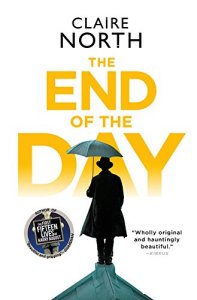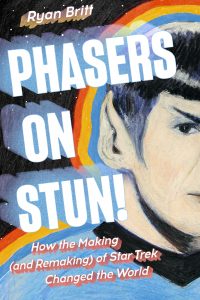Gary K. Wolfe reviews Claire North
The End of the Day, Claire North (Redhook 978-0-316-31674-3, $26.00, 456pp, hc) April 2017.
 Claire North seems to have emerged as the preferred pseudonym for high-concept adult fiction from the successful YA author Catherine Webb, and it earned her a Campbell Award for The First Fifteen Lives of Harry August and strong reviews and for the subsequent Touch and last year’s The Sudden Appearance of Hope. While none of these concepts were quite as original as they might have seemed (Touch echoed Silverberg’s ‘‘Passengers’’ and the forgettability of the central character in Hope was essentially the same superpower as a character in Westerfeld, Biancotti & Lanagan’s Zeroes a year earlier), North approached them with considerable good humor and narrative skill, developing sympathetic characters who could pull readers through even when the structure was occasionally less than linear. The End of the Day is her least linear tale so far, a series of mostly disconnected episodes in the career of Charlie, a rather hapless everyman whose latest job, financed by a mysterious corporate office in Milton Keynes, is the Harbinger of Death – meaning that he’s dispatched all over the world to certain individuals shortly before they are visited by Death – sometimes as a courtesy, sometimes as a warning, and sometimes to foretell the death of an idea or a tradition (one of the first victims we meet is an old woman in Peru who is the last living speaker of her language).
Claire North seems to have emerged as the preferred pseudonym for high-concept adult fiction from the successful YA author Catherine Webb, and it earned her a Campbell Award for The First Fifteen Lives of Harry August and strong reviews and for the subsequent Touch and last year’s The Sudden Appearance of Hope. While none of these concepts were quite as original as they might have seemed (Touch echoed Silverberg’s ‘‘Passengers’’ and the forgettability of the central character in Hope was essentially the same superpower as a character in Westerfeld, Biancotti & Lanagan’s Zeroes a year earlier), North approached them with considerable good humor and narrative skill, developing sympathetic characters who could pull readers through even when the structure was occasionally less than linear. The End of the Day is her least linear tale so far, a series of mostly disconnected episodes in the career of Charlie, a rather hapless everyman whose latest job, financed by a mysterious corporate office in Milton Keynes, is the Harbinger of Death – meaning that he’s dispatched all over the world to certain individuals shortly before they are visited by Death – sometimes as a courtesy, sometimes as a warning, and sometimes to foretell the death of an idea or a tradition (one of the first victims we meet is an old woman in Peru who is the last living speaker of her language).
Beginning a novel with a character who rather blithely introduces himself everywhere as the Harbinger of Death carries with it certain risks. On the one hand, it sounds dangerously like the set-up for a Monty Python skit or a Terry Pratchett riff; on the other, it could portend a sentimental death-romance along the lines of old movies like A Guy Named Joe or Heaven Can Wait. North eventually takes us in both directions at different times – there are some distinctly funny bits, and some rather cloying inspirational speechifying toward the end – but not before she leads us through a fragmented, episodic narrative which builds thematically in the manner of earlier episodic tales as varied as Melville’s The Confidence Man, or Kosinski’s Steps or – perhaps more to the point – some of those late Harlan Ellison compound tales unified by a central, not-quite-supernatural figure like ‘‘The Man Who Rowed Christopher Columbus Ashore’’. Between the various episodes are snippets of conversations, presumably overheard by Charlie on his travels, which touch upon various contemporary issues from climate change to terrorism, sexism, homophobia, nationalism, and racism – the collective effect of which is to suggest that Death may be, if anything, a bit underworked.
Climate change is also an issue in Charlie’s first extended adventure, tracking down a scientist researching the ice loss in a remote area of Greenland. Later episodes have him visiting a British family facing eviction because of a new housing development, traveling to Syria, to Mexico, to Nigeria where he befriends a female standup comedian, to Belarus where he’s badly beaten by thugs, and eventually to Orlando, where in his most unusual assignment he’s to drive a man named Robinson to New York, along the way encountering everyone from an unreconstructed Klan member to a scientist who fears (perhaps more presciently than North intended) that reason is dead. Few seem to question Charlie’s unlikely occupation, even though it creates a bit of a strain with his tentative girlfriend Emmi, and every now and then his paths cross those of other apocalyptic horsemen Famine, Pestilence, and War. For a chapter or two, the point of view even briefly shifts to that of Death itself, who sometimes appears as male and sometimes as female (as Charlie explains, everyone sees their own version of Death). Episode by episode, North’s narrative can be gripping and vivid, but in trying to cover such a huge panorama of modern society, it veers sometimes toward editorial-cartoon allegory, sometimes toward absurd comedy, sometimes toward blunt homiletics (as when Death makes what sounds like a campaign speech about the dream represented by America), and sometimes toward genuine tragedy. With its fragmented structure and occasionally self-consciously meditative prose, The End of the Day might puzzle some who enjoyed the thriller plotting of The Sudden Appearance of Hope, but at its best it reaffirms the passion and ambition that have made North such a consistently intriguing writer.





